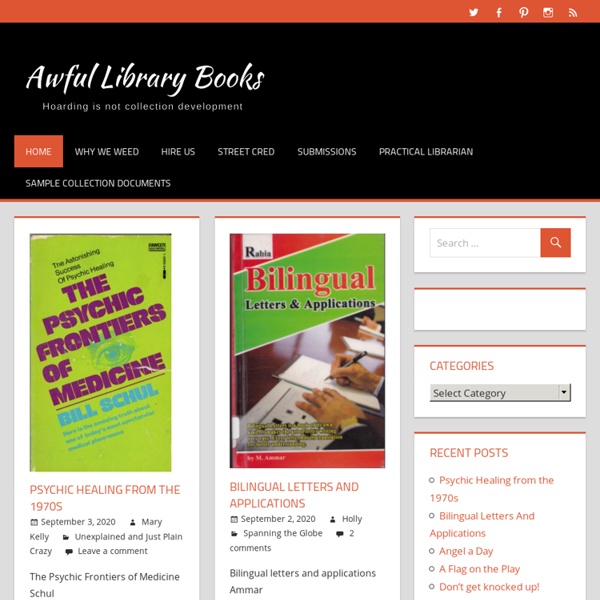



Weeding the Worst Library Books Last summer, in Berkeley, California, librarians pulled roughly forty thousand books off the shelves of the public library and carted them away. The library’s director, Jeff Scott, announced that his staff had “deaccessioned” texts that weren’t regularly checked out. But the protesters who gathered on the library’s front steps to decry what became known as “Librarygate” preferred a different term: “purged.” “Put a tourniquet on the hemorrhage,” one of the protesters’ signs declared. “Don’t pulp our fiction,” another read.
Blog What’s your tech personality? When it comes to new technologies, are you mainly a visionary or an implementer? Find out by taking this quiz. Tell us your results in the comments! read more New Book: Siri, Alexa, and Other Digital Assistants: The Librarian’s Quick Guide Windows and Mirrors: Why We Need Diverse Books By Chad Everett, guest blogger I was an undergraduate student the first time it happened. One of my professors shared the following line from W.E.B. Dubois’ The Souls of Black Folk: “One ever feels his twoness, -- an American, a Negro; two souls, two thoughts, two unreconciled strivings; two warring ideals in one dark body, whose strength alone keeps it from being torn asunder.”
The Librarian Edge — Katie Day Diversity is a hot topic in children’s and YA literature at the moment, but for us working as school librarians in international schools, it’s always been an issue as we strive to provide access to texts that reflect our varied student populations, curriculum concerns, local context, and worldview. One of the most fertile channels for discovering new literature to bring into our schools is the annual book award shortlists generated by country-based international school librarian networks. Most of you in the audience have participated in one or more of these, whether getting your students to read and vote on the books or working with your network colleagues to help choose books to shortlist every year. Of all the experiences of being in a locally-based international school teacher librarian network like ISLN in Singapore or BLISS in Bangkok, the most rewarding aspect for me has been being involved in the running of their annual book awards. But what's the important thing here?
Assignment 2: Collection development policy response paper Assignment Introduction and Slides Objectives: Students will evaluate two collection development policies for strengths and weaknessesStudents will practice professional communication skills in writing a concise analytical response paper The Digital Shift — On Libraries and New Media, powered by Library Journal and School Library Journal 5 Tips for Makers on a Budget from a Teen Librarian By The Digital Shift on August 4, 2017 “Teen Librarian Toolbox” blogger and SLJTeen Live! panelist Karen Jensen shares some ideas and resources for low-budget maker spaces. The Chatty Librarians: Podcasting | Field Reports By The Digital Shift on June 27, 2017
School Library Journal Four bold strategies to elevate your school library. Illustration by James Yang “A university is just a group of buildings gathered around a library,” wrote the historian and novelist Shelby Foote. Prizing Balance: an exploration of world children's literature — Katie Day Diversity is a hot topic in children’s and YA literature at the moment, but for us working as school librarians in international schools, it’s always been an issue as we strive to provide access to texts that reflect our varied student populations, curriculum concerns, local context, and worldview. One of the most fertile channels for discovering new literature to bring into our schools is the annual book award shortlists generated by country-based international school librarian networks. Most of you in the audience have participated in one or more of these, whether getting your students to read and vote on the books or working with your network colleagues to help choose books to shortlist every year.